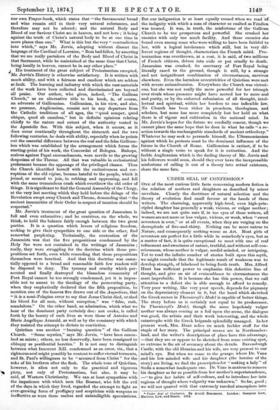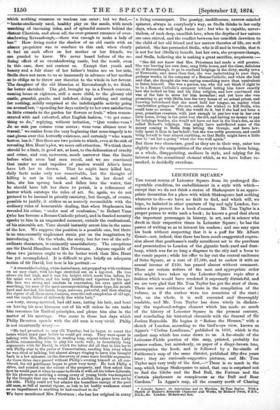UNDER SEAL OF CONFESSION.*
ONE of the most curious little facts concerning modern fiction is the relation of mothers and daughters as described by minor novelists. Clearly the doctrines of natural selection and the theory of evolution find small favour at the hands of these writers. The charming, apparently high-bred, even high-prin- cipled daughter has generally a weak, vicious, or vulgar mother ; indeed, we are not quite sure if, in tne eyes of these writers, all women are not more or less vulgar, vicious, or weak, when "sweet seventeen is over," or at all events, when they are verging on the decrepitude of five-and-thirty. Nothing can be more untrue to Nature, and consequently nothing worse as Art. Most girls of seventeen are perfect for a little while in somebody's eyes, but as a matter of fact, it is quite exceptional to meet with one of real refinement and sweetness of nature, truthful, and without self-con- sciousness, whose mother is vulgar, sordid-minded, or intriguing. Yet to read the infinite number of stories built upon this myth, we might conclude that the legitimate result of weakness was to develop strength, of falsehood to bring forth truth. Mrs. Alfred Hunt has sufficient power to emphasise this defective line of thought, and give an air of vraisemblance to circumstances the most improbable. It is because she has this power, that we call attention to a defect she is able enough to afford to remedy. Very poor writing, like very poor speech, depends for piquancy on the depreciatory element in it, but the hand which sketched the Greek scenes in 7'hornicrofes Model is capable of better things. The story before us is certainly not equal to its predecessor. In Thornicrofes Model, though the same hopelessly vulgar mother was always coming as a foil upon the scene, the dialogue was good, the artists and their work interesting, and the whole catastrophe with the Greek brigands splendidly managed. In her present work, Mrs. Hunt relies on much feebler stuff for the staple of her story. The principal scenes are in Northumber- land, and the writer's descriptions of place have this advantage, —that they are or appear to be sketched from some existing spot, so extreme is the air of accuracy about the details. Ravensburgh Castle, with the old librarian and his wife, are very present to our mind's eye. But when we come to the grange, where Dr. Vane and his low-minded wife and his daughter (the heroine of the story) are living, we find the prescription for "making a lady" of Stella a somewhat inadequate one. Dr. Vane is anxious to remove his daughter as far as possible from her mother's superintendence, —" to give her habits of self-culture, and to introduce her into regions of thought where vulgarity was unknown." So far, good ; we will not quarrel with that extremely rarefied atmosphere into • Under Seal of Confusion. By Averil Beaumont. London: Sampson Low, Minton, Low, and Searle. 1874. which nothing common or unclean can enter ; but we find,— " booka studiously used, healthy play on the sands, with much watching of incoming tides, and of splendid sunsets behind the distant Cheviots, and above all, the ever-present romance of over- shadowing Ravensburgh,—there was enough to make a lady of her." How • living under the shadow of an old castle with an absent proprietor was to conduce to this end, when clearly it had no such effect on her mother or her friends, we are puzzled to know. We never heard before of the re- fining effect of an overshadowing castle, but the result, even in this case, does not content us. Except that youth and beauty and a fair share of her father's brains are on her side,. Stella does not seem to us so immensely in advance of her mother as to oblige us to throw our theories to the winds in her favour. The daughter of the old librarian at Raveiasburgh is, we think, far better sketched. The girl, brought up in a French convent, coming home at eighteen, still a mere child, to the gloomy old castle, graceful, gentle, and indolent, doing nothing and caring for nothing, mildly surprised at the indefatigable activity going -on around her, "spending her days entirely to her own satisfaction in little errands to the garden for flowers or fruit," when remon- strated with and exhorted, after English fashion, "to get some- thing to dog" replying, without irritation, " Que voulez-vous ? Je ne suis pas comme vous autres ; vous vous abimez avec le travail," we realise from the very beginning that some tragedy is to oast gloom over this butterfly existence, and certainly "who wants horror, has it." But there are two points to which, even at the risk of revealing Mrs. Hunt's plot, we must call attention. We think there should be a limit, in good art, at least, to the delineation of cruelty and crime, and one, moreover, much narrower than the limits before which even bad men recoil, and we are convinced that under no mad impulses of passion would Alice's lover have left her to drown. That he might have killed her, 'daily facts make only too conceivable, but the thought of killing is not in his mind, and when, in her dread of him, she has sprung back and fallen into the water, that he should have left her there ta perish, is a refinement of -horror which outsteps the rules of art. So, again, we do not pretend to be learned in priestly casuistry, but though, of course, possible to justify, it strikes us as scarcely reconcilable with the ordinary rules of honourable dealing, that when Stephenson has revealed his crime, "under seal of confession," to Robert Vane (who haa become a Roman Catholic priest), and in fancied security ,apeaks ti him in an unguarded moment, outside the confessional, of hiamiserable act, Vane should instantly arrest him in the name of the law. We suppose the position is a possible one, but there is an unnecessarily unpleasant strain put on the imagination by introducing it. On the whole, the story, but for two of the sub- ordinate characters, is eminently- unsatisfactory. The exceptions -are Sir David Hamilton and Mrs. Priestman. Anyone capable of -these two pictures ought to do far better work than Mrs. Hunt has yet accomplished. It is difficult to give briefly an adequate notion of Sir David, but here is his portrait :— "A venerable-looking, white-haired man, sat propped up with cushions on an easy chair, with his legs stretched out on a leg-rest. He was above six feet high, and it was his height which made him infirm, for his mind was active, and his body healthy and vigorous for his age. His face was strong and resolute in expression, his eyes quick and searching, his nose of the most uncompromising Roman type, his month hard and decided, his hands large, nervous, powerful, and then abating the rigour of all these stern features, were the soft complexion of old age, and the ample flakes of delicately fine white hair,"
—a testy, strong-natured, bad old man, hating his heir, and bent on leaving his next kinsman out of his will unless he can make him renounce his Radical principles, and, please him also in the matter of his marriage. One scene in those last days which Philip Brereton spends with the old man is very vivid. Philip is not unnaturally weary :—
• "He had promised to stay till Tuesday, but he began to count the hours which must pass before he could get away. They were spent in talking with Mrs. Hamilton, in reading long, urgent letters from Lady _Letitia, commanding him to play his cards well; in formidably long arguments with Sir David, in which the latter did all that in him lay to -win Philip over to the paths of Conservatism, sending him away when he was tired of talking, but almost always ringing to have him brought back in a few minutes, on the discovery of some more forcible argument. As these three days passed without Philip's owning himself at all con- vinced, the old gentleman began to grow very testy. He took Philip a drive, and pointed out the extent of the property, and then asked him bow he would part it when he came to divide it with all his fellow-Liberals. Or his pleasure in noticing a strong covey of young birds was tempered by the thought that one who would like to abolish the game laws sat by his side. Philip could not but admire the boundless energy of the poor old man, so full of mental vigour, so loth to let bodily weakness count as an impediment to anything he had resolved to do."
We have mentioned Mrs. Priestman ; she has her original in many a living counterpart. The gossipy, meddlesome, narrow-minded spinster, always in everybody's way, as Stella thinks in her early days, when she well nigh hates her ; but who is capable, never- theless, of such deep, unselfish love, when the depths of her nature are once stirred, and the conflict between her unselfish devotion to the child of her old friend and her narrow theories of life, are well painted. She has persuaded Stella, who is ill and in trouble, that it is not for her (Stella's) benefit, but her own, she proposes change, and Stella, believing she is making a great sacrifice, acquiesces :—
"She did not know that Mrs. Priestman had made a still greater. She was leaving her own dear, snug little house, and the clear, delicious air of Ravensburgh, to go to confined lodgings in the -dirty, smoky town of Newcastle, and, more than that, she was undertaking to pass days, 't perhaps weeks, in the company of a Roman Catholic, and when she had said that, she thought she was saying something more than equivalent to Satan himself. She was a person, too, who did not think it right to be in a Roman Catholic's company without letting him know exactly how she looked on him and his false religion, and how convinced she was of the fate in store for him hereafter; and yet here she was promising to go with Stella into the very house of an actual priest, and knowing beforehand that she must hold her tongue, no matter what 'unchristian goings-on 'She saw, unless she wished to kill Stella, who could bear no scenes. Well, she would do it, but if she had not been a poor, penniless creature, with just enough to pay her way in her own little home, living in the quiet way she did, and having no money to pay for lodgings besides, she would not have set foot in the lion's den, as she called Robert's lodgings. She might have anticrpated some of the money coming to Stella from letting the Grange, and have law- fully spent it thus in her behalf ; but she was nobly generous, and could bring herself to bear almost anything, so that Stella might have a little sum to set her a-going ' when she was well again."
But these two characters, good as they are in their way, enter too slightly into the composition of the story to redeem it from being, as a whole, disappointing, mediocre in style, and relying for its interest on the sensational element which, as we have before re- marked, is decidedly overdone.































 Previous page
Previous page